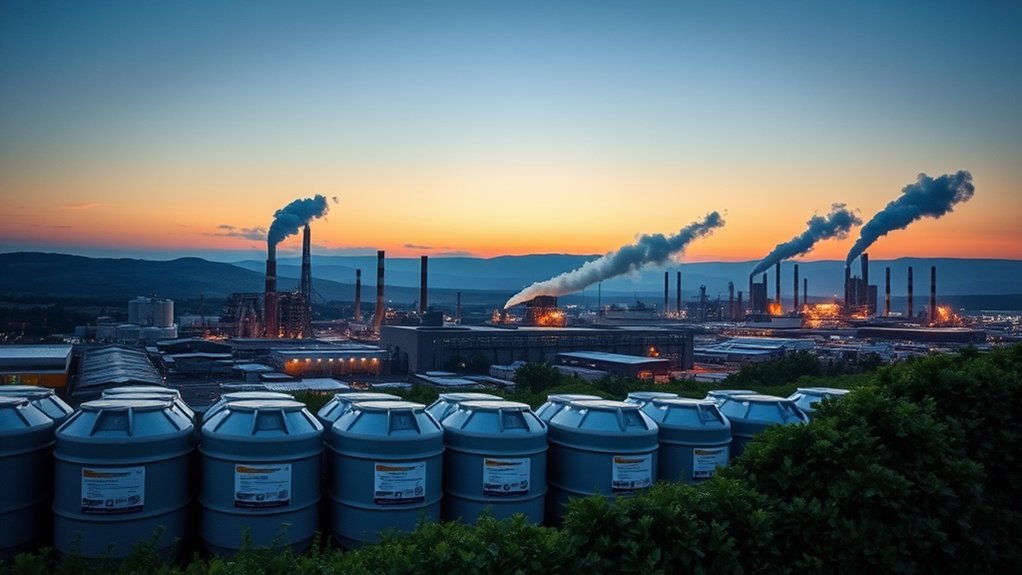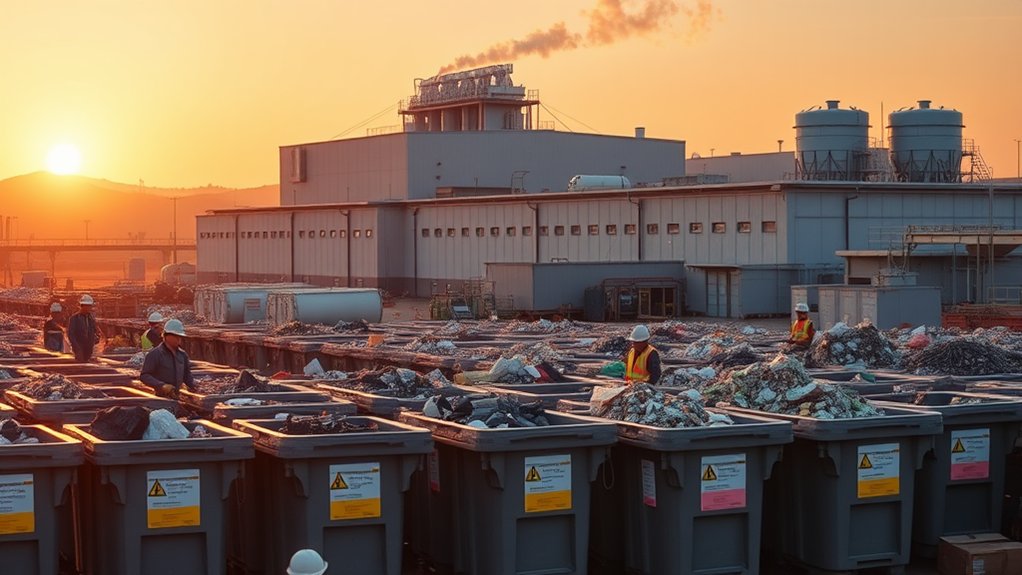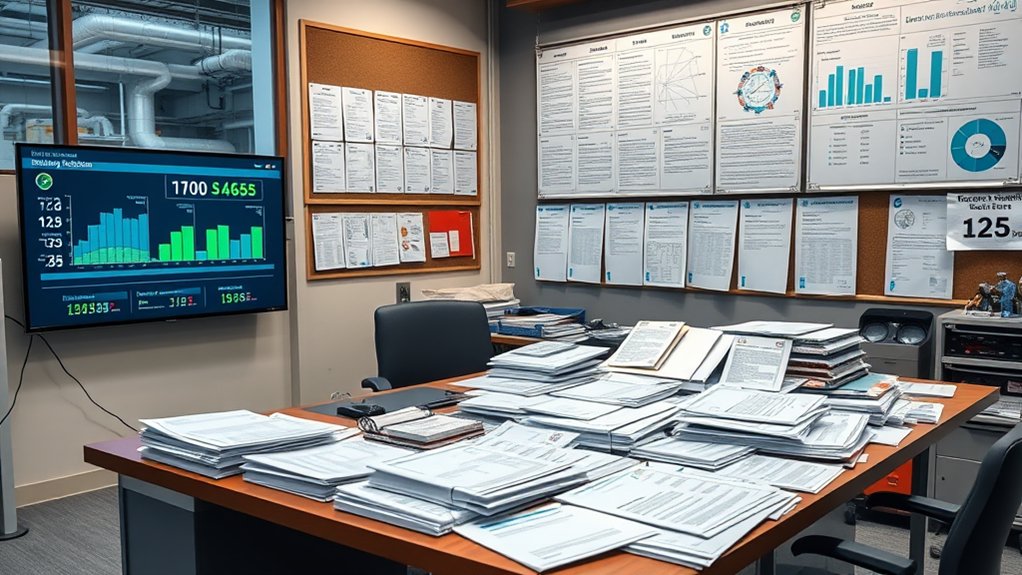As an industrial license holder, you must comply with various environmental and safety regulations. You need permits for air quality, water discharge, and hazardous waste management. An Environmental Impact Assessment (EIA) is necessary for obtaining these permits. Safety regulations require a Health and Safety Compliance Certificate and a solid Emergency Response Program. You also have to manage waste properly and monitor emissions to stay within legal limits. Regular inspections will occur to verify compliance, and failing to meet regulations can result in fines or losing your permit. There's more to understand about these requirements and their implications.
Overview of Environmental Regulations

Environmental regulations play a crucial role in ensuring that industrial license holders operate responsibly.
These regulations require you to obtain various permits, including those for air quality, water discharge, and hazardous waste. Compliance with these standards is mandatory, and you must conduct an Environmental Impact Assessment (EIA) to evaluate potential effects of your activities. A comprehensive report is necessary for permit approval.
Regular inspections by the Department of Environment ensure adherence to these regulations. If you fail to comply, you might face fines or even permit revocation.
It's also essential for you to implement an Emergency Response and Safety Management Program to prepare for environmental incidents and secure permits for pollution control facilities.
Safety Compliance Requirements
To ensure a safe working environment, you must adhere to specific safety compliance requirements mandated for industrial license holders. Failing to meet these can lead to serious consequences.
Here are three key requirements:
- Obtain Health and Safety Compliance Certificates through inspections that confirm adherence to local health regulations.
- Implement an Emergency Response and Safety Management Program to prepare for potential incidents in your manufacturing facility.
- Conduct regular safety audits and employee training programs to reinforce operational standards and ensure everyone is aware of safety protocols.
Investing in safety equipment and maintaining compliant machinery is essential for minimizing risks.
Regular inspections by regulatory agencies help verify your compliance with safety measures, ensuring you consistently meet necessary operational standards.
Waste Management Protocols

Effective waste management protocols are crucial for industrial license holders to comply with UAE environmental regulations. You must properly segregate, store, and dispose of both hazardous and non-hazardous waste. An Environmental Impact Assessment (EIA) helps identify waste generation impacts and develop waste minimization strategies. Regular monitoring and reporting are essential to ensure compliance and avoid penalties. Your company should establish a waste management plan detailing collection, transportation, and treatment procedures, including recycling processes. Compliance with the Emirates Authority for Standardization and Metrology (ESMA) standards guarantees that your waste management practices meet national safety benchmarks.
| Waste Type | Management Approach |
|---|---|
| Hazardous Waste | Segregation & Safe Disposal |
| Non-Hazardous Waste | Recycling & Recovery |
| Both | Monitoring & Reporting |
Emissions Control Standards
While you might focus on various aspects of industrial operations, ensuring compliance with emissions control standards is vital for maintaining air quality and protecting the environment.
Understanding these standards can help you avoid penalties and ensure your operations are environmentally responsible. Here are three key points to consider:
- Obtain air quality permits that specify permissible emission limits for pollutants like particulate matter and nitrogen oxides.
- Regularly monitor and report emissions to align with air quality standards and regulatory requirements.
- Implement effective pollution control technologies to minimize emissions from your industrial processes.
Documentation and Reporting Obligations

Ensuring thorough documentation and timely reporting is crucial for industrial license holders, as it not only meets regulatory requirements but also promotes environmental accountability. You must conduct an Environmental Impact Assessment (EIA) to identify potential risks and submit it to regulatory authorities for approval. Regular emissions monitoring and waste management practices are mandatory for compliance with local regulations.
Here's a quick overview of your obligations:
| Obligation | Description |
|---|---|
| Environmental Impact Assessment (EIA) | Identify and report potential environmental risks |
| Emissions Monitoring | Regularly track and report emissions levels |
| Waste Management Practices | Maintain records of waste disposal methods |
| Emergency Response Program | Document procedures for addressing incidents |
| Operational Procedures | Keep accurate records of all compliance measures |
Failure to comply can lead to penalties, including fines or permit revocation.
Frequently Asked Questions
What Is an Industrial License in the UAE?
In the UAE, an industrial license grants you operational benefits, requires specific documentation, and involves a straightforward application process. You'll encounter various license types, fees, and need to renew it yearly with approval from relevant authorities.
What Is the Legal Environment in the UAE?
In the UAE, you navigate a robust legal framework encompassing business regulations and licensing requirements. Adhering to environmental standards and safety protocols is crucial, as governmental agencies enforce regulatory compliance and impose compliance penalties for violations.
What Are the Three Types of Business Licenses in the UAE?
In the UAE, you'll encounter three license types: the Commercial License for trade, the Professional License for services, and the Industrial License for manufacturing. Each has specific business requirements set by the licensing authority.
Which Trade License Is Best in the UAE?
To find the best trade licenses in the UAE, consider your business options and growth potential. Free zone licenses offer benefits like 100% foreign ownership, while industrial licenses enhance operational flexibility. Always compare costs and licensing processes!
Conclusion
In summary, understanding environmental and safety regulations is crucial for industrial license holders. You must comply with various standards, including waste management and emissions control. Keeping accurate documentation and reporting regularly is also essential. By following these regulations, you help protect the environment and ensure workplace safety. Staying informed and proactive can help you meet your legal obligations and contribute positively to your community and industry.

